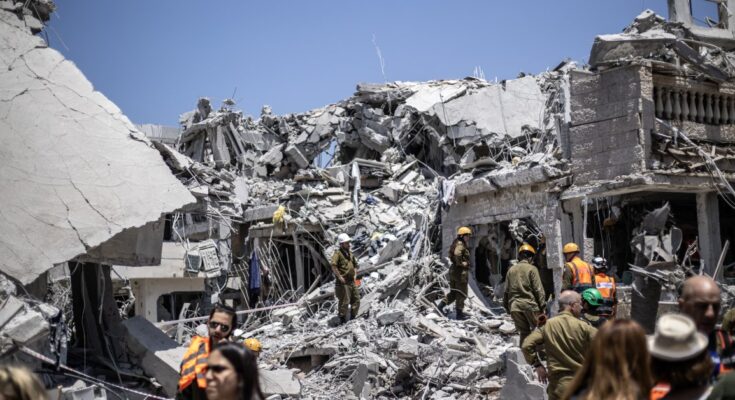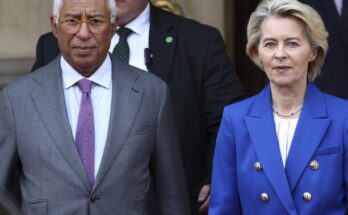After striking back on Friday night, Iran launched a new wave of strikes toward Israel on Saturday morning. Now, the two countries continue to exchange deadly missiles and threats, with fatalities and injuries reported on both sides. Iran followed through on its vow to retaliate after Israel carried out a “precise and integrated preemptive strike” against Iranian nuclear facilities, targeting military personnel and scientists.
In a video address on Saturday evening, local time, Israeli Prime Minister Benjamin Netanyahu said: “We have paved a path to Tehran. In the very near future, you will see Israeli planes, the Israeli Air Force, our pilots, over the skies of Tehran.”
He also warned that Israel “will strike every site and every target of the Ayatollah’s regime.”
“We have dealt a very severe blow to Iran’s main enrichment site and, if necessary, we will also hit it again,” Netanyahu maintained.
His comments come after Israel’s Defense Minister Israel Katz on Saturday morning threatened severe consequences if Iran’s Supreme leader Ayatollah Ali Khamenei doesn’t retreat. “If Khamenei continues to fire missiles at the Israeli home front, Tehran will burn,” Katz said, after a meeting with leaders of the Israeli military.
“The Iranian dictator is turning Iran’s citizens into hostages and creating a reality in which they, especially the residents of Tehran, will pay a heavy price for the criminal attacks on Israeli civilians.”
According to state media, Iran’s President, Masoud Pezeshkian, has warned of a “more severe” response if Israel continues its attacks.
“The continuation of Zionist [Israeli] aggression will be met with a more severe and powerful response from the Iranian armed forces,” Pezeshkian is quoted as saying, reportedly during a phone call with Pakistani Prime Minister Shehbaz Sharif.
Read More: Israel Gets the War It Wanted
Israel reported that at least three people had died and dozens have been injured after Iranian strikes rained down on Tel Aviv and nearby cities. Iran’s U.N. Ambassador reported that over 70 people have been killed and over 300 wounded as a result of the Israeli strikes. The escalation of traded strikes has raised concerns for civilians on both sides.
According to multiple outlets, Iranian state media reported on Saturday that Iran has warned the U.K., U.S., and France not to defend Israel against Iranian drones or missiles. Iran reportedly said it will target ships and bases belonging to the those countries if that should happen.
A spokesperson from Downing Street—the official residence of U.K. Prime Minister Sir Keir Starmer—on Saturday reaffirmed Starmer’s goal to support a diplomatic resolution. It was revealed that Starmer had spoken to Saudi Arabia’s Crown Prince Mohammed bin Salman and “they discussed the gravely concerning situation in the Middle East and agreed on the need to de-escalate.”
Starmer also spoke with Netanyahu. Per Downing Street, the “Prime Minister was clear that Israel has a right to self-defense and set out the U.K.’s grave concerns about Iran’s nuclear programme. He reiterated the need for de-escalation and a diplomatic resolution, in the interests of stability in the region.”
U.S. Secretary of State Marco Rubio spoke out shortly after Israel launched its initial operative strikes against Iran, announcing that the U.S. were not participants in the military action. “Israel took unilateral action against Iran. We are not involved in strikes against Iran… Let me be clear: Iran should not target U.S. interests or personnel,” the statement read.
Speaking on Saturday, U.S. Secretary of Defense Pete Hegseth said that Trump is “dialed in” on the escalating conflict and it’s being monitored closely.
“The American people can be assured that Trump is dialed in. This is not an autopen moment. We had that where the world saw our gaze distracted or not paying attention at all. President Trump is dialed in,” Hegseth said, referencing the Trump Administration’s ongoing “autopen” investigations. “I get to see it every single day. He knows every single dynamic of what’s going on here, and I’ll tell you what he’s doing here. He’s putting America first.”
Additionally, Trump revealed on Saturday afternoon that President Vladimir Putin of Russia had called him earlier in the day, and that the two had discussed Iran at length. “He feels, as do I, this war in Israel-Iran should end, to which I explained, his war should also end,” Trump said, referencing the on-going Russia-Ukraine war.
Trump also shared a phone call with British leader Starmer, where they “discussed the military action in the Middle East overnight and agreed on the importance of diplomacy and dialogue.”
France’s President Emmanuel Macron also publicly addressed the Middle East unrest, saying he had recently spoken with the President of Iran, Masoud Pezeshkian.
“In my first message, I called for the immediate release of our compatriots, Cecile Kohler and Jacques Paris, who have been held hostage by the Iranian regime for more than three years in unacceptable conditions. Given the serious risk of instability across the region, I emphasized that our diplomatic facilities and citizens in Iran and the region must not be targeted under any circumstances,” Macron said. “I also called for maximum restraint to prevent an escalation of tensions. The issue of Iran’s nuclear program is a serious issue that must be resolved through negotiations. Therefore, I invited the President to return to the negotiating table as soon as possible to reach an agreement, as this is the only way to reduce tensions.”
Netanyahu addressed the “esteemed people of Iran” directly in a filmed statement on Friday night.
“We are in the midst of one of the largest military operations in history. The Islamic regime that has oppressed you for almost 50 years threatens to destroy our country, Israel,” Netanyahu said. “The goal of Israel’s operation is to prevent the Islamic regime’s nuclear and ballistic missile threats.”

“While we achieve our goal, we also pave the way for you to achieve your freedom,” he continued. “In the past 24 hours, we have destroyed senior military commanders, prominent nuclear scientists, the Islamic regime’s most important enrichment facility, and a large part of its ballistic missile arsenal. Another operation is underway”
Netanyahu went on to say that the regime in Iran has “never been so weak” and urged Iranians to use the opportunity to “stand up” and make their voices heard.
Read More: Here Are the Top Iranian Generals and Scientists Targeted and Killed by Israeli Strikes
Israel’s initial strikes on Iran in the early hours of Friday morning, local time, came amid long-time concerns as to the progression of the country’s nuclear capabilities. The United States has been engaged in ongoing talks with Iran, in an effort to make a nuclear deal.

Another round of talks between the U.S. and Iran was set to take place in the Sultanate of Oman’s capital of Muscat on Sunday, but they will no longer be going ahead.
Oman’s Foreign Minister Badr Albusaidi announced on Saturday afternoon: “The Iran-U.S. talks scheduled to be held in Muscat this Sunday will not now take place. But diplomacy and dialogue remain the only pathway to lasting peace.”
This comes after Iran’s Foreign Ministry spokesman Esmail Baghaei called nuclear talks with the U.S. “meaningless,” according to state television.
Read More: Trump Issues Grave Warning to Iran After Israeli Strikes: ‘No More Death, No More Destruction’
President Donald Trump on Friday issued a grave warning of his own to Iran, urging them to make a nuclear deal before the combat escalated further, which it since has.
Detailing how he has long sought to make an agreement with Iran, Trump said: “I told them, in the strongest of words, to ‘just do it,’ but no matter how hard they tried, no matter how close they got, they just couldn’t get it done… Certain Iranian hardliners spoke bravely, but they didn’t know what was about to happen. They are all DEAD now, and it will only get worse.”

